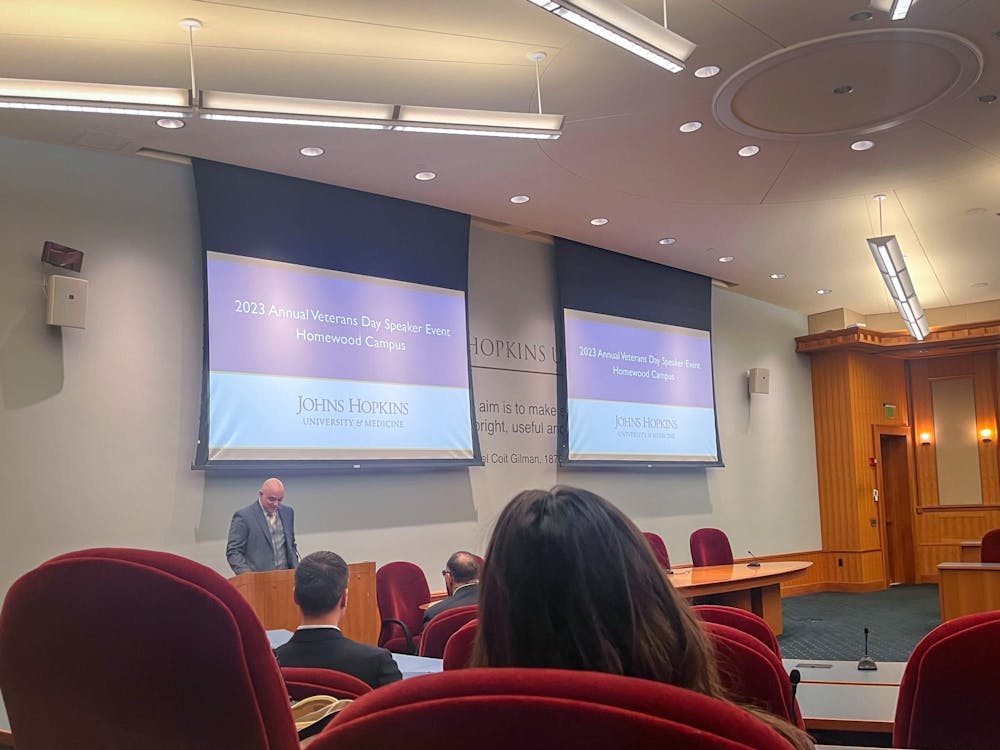Brigadier General Adam Flasch and Whiting School of Engineering Dean Ed Schlesinger spoke during a keynote event at the Homewood Campus for Veteran’s Day on Friday, Nov. 10. This event was the last of a series of events and celebrations that the Johns Hopkins Medicine Veterans Employee Resource Group (ERG) hosted from Nov. 7–10 to honor those who have served in the armed forces.
The weeklong appreciation series kicked off with Patriotism Day on Nov. 7, followed by a keynote event in Hanover, Md. on Nov. 8 with J.P. Holland, president of Johns Hopkins Health Plans, attending as a keynote speaker. A morning workout with the Hopkins Reserve Officer Training Corps (ROTC) also occurred on Nov. 9, the day before the last keynote speeches took place both in Baltimore and Washington, D.C.
The Veterans ERG’s goal of hosting these events is to create an intellectually diverse environment where students can interact with and learn from veterans, who make up a minority group on campus, according to Ken Barnes, co-chair of the Veterans ERG. He highlighted what students could gain from the veteran community on campus in an email with The News-Letter.
“I strongly encourage students to become more involved with veteran events on campus as a way to better understand the issues important to the veteran community because this will translate into making those students more capable as leaders upon graduation,” he wrote.
The speeches at the Friday keynote event echoed Barnes’ sentiments. After an introduction from Vice President of Facilities and Real Estate Bob McLean, Schlesinger began his speech emphasizing the value Hopkins places on the veteran community.
“[Veterans] bring us a strong citizen volunteer group [with] leadership training, logistical skills and selflessness to our Hopkins community,” he said.
He also mentioned how Hopkins was rated a top employer for veterans based on a Forbes survey of over 5,000 veterans and was one of four educational employers on the list of overall top 200 employers.
Veterans make up some of the diversity on campus, not just in the school demographics but also in the broad research and academic pursuits at the University that could impact the country and its military. The research centers for machine learning, AI and data science, housed within the Whiting School of Engineering, were one of his examples of such academic pursuits.
“This... is going to capitalize on the rapidly emerging potential data to drive discovery across the years,” he said. “This type of groundbreaking investment technology will have ripple effects throughout the University through advances in medicine, strategic international diplomatic relations and space exploration. And yes, the national security.”
Schlesinger went on to explain the budding success of a new interdisciplinary program with the U.S. Space Force in liaison with the School of Advanced International Studies and the Whiting School of Engineering. He hopes that these programs will benefit not only the University and students but also have a national impact.
Flasch took the podium following Schlesinger’s speech. Flasch was recently appointed Director of the Governor's Office of Homeland Security, after serving as a brigadier general for 34 years.
Flasch initially joined the Maryland National Guard as a way to pay for college and car repairs. His choice ultimately changed the trajectory of his life. He emphasized how the military was an engine of economic opportunity for U.S. citizens, allowing Flasch to go to community college and then complete a graduate degree at no cost.
Flasch also described what military service entailed and the journey those who served undertook. He closed by stressing to the attending veterans the importance of mental health.
“You are still you,” he said. “You're still the warrior, leader, battle buddy and wingman teammate that you were for our nation. For those that have transitioned well, I'd say a ‘good job.’ For those still working through it, hang in there. Keep at it, you will figure it out. In closing, we can raise the need for continued care for the mental health of our veterans.”
When it comes to students on campus and all college students in general, Flasch emphasized in an interview with The News-Letter the importance of being politically engaged and taking action in meaningful ways.
“Write to [elected officials], talk to them, expect them to listen to you because you're really the boss. Learning how your government works, how bills flow, how to affect policy is really important,” he said. “And coming from a flagship institution like... Hopkins, your voice is going to be louder than most because your degree will confer upon you a level of expertise that few institutions can confer.”
Freshman and ROTC Member Rad Couture participated in the events and reflected upon the weeklong events in an interview with The News-Letter.
“I think it's imperative that Hopkins has these kinds of events,” he said. “Those are the people that are serving our country, so I think it's important that we honor that and respect that. And bring some awareness to them.”

















